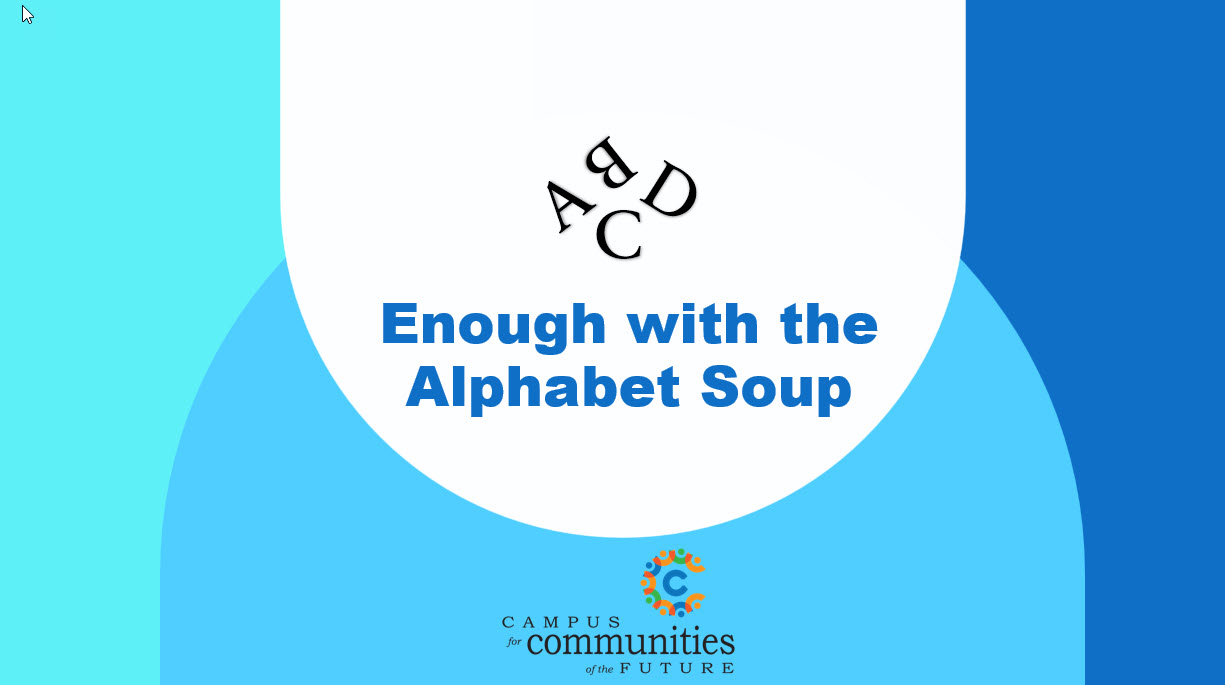Enough with the Alphabet Soup

Words matter – the simpler the better - especially now when we’re overwhelmed by data and living in a world that is changing at a blistering pace.
Not only are changes resulting in complex issues and opportunities, they have also prompted new, often complex language, taxonomies, and lexicons. Taxonomies being how we classify the information, and the lexicon being the list of terms and their definitions.
So here’s the problem. We rarely seem to begin our responses to these issues and opportunities by agreeing on, and using consistent and clearly conveyed plain language. This is particularly important when responses demand new collaborations.
It is very evident in my work as a sector-connector focused on community economic development using a whole-community approach, that many are grappling to find solutions for addressing interlinked, complicated challenges and opportunities.
Many are struggling to have their voice and solutions heard, particularly the outliers and innovators who are often dismissed, particularly if new language is used.
Like others, I find my work is challenged by varying taxonomies and lexicons.
For example, my work that brings citizens, businesses, government, and social profits together at the local level to address complex issues and opportunities, is known by many other names.
While we’ve found the best way to describe what we do as being a whole community approach, others refer to it as whole-of-society, or community development. Historically, Indigenous communities apply a holistic approach based on the medicine wheel, others are referring to it as social solidarity economy (SSE), community or stakeholder-led development, place-based development, circular economy, systemic transformation, community economic development etc.
While they aren’t all exactly the same there are many common elements.
Regardless, this alphabet soup has created a lot of confusion and often stalled meaningful action because the dots aren’t always connected.
Collaborations are much more efficient and effective when common language can be agreed upon.
Of course not ever situation is the same, however agreed upon taxonomies and lexicons will ensure efficient data management by making it simpler to organize, manage and analyze the data that is essential for better informed decision-making, policy, and funding.
If we don’t make the time to simplify and agree on the words we use, we really will be comparing apples with oranges, and grapes, and bananas and more.
We need quality data not only to ensure informed decision-making, but also to connect the dots between what already exists so we don’t recreate what has already been created.
Along the way, we should also listen carefully to those who might be using different terminology. It could be they are the positive deviants who might just have something valuable to add that will ensure new and improved conversations and solutions.
#ClearCommunication #Collaboration #Taxonomy #Lexicon #PositiveDeviants
Posted on 07-19-23Next entry: Complexity Stalls Action
Previous entry: Running on the Right Road?

 Brenda Herchmer is the owner of Grassroots Enterprises, a community development consulting company.
Brenda Herchmer is the owner of Grassroots Enterprises, a community development consulting company.